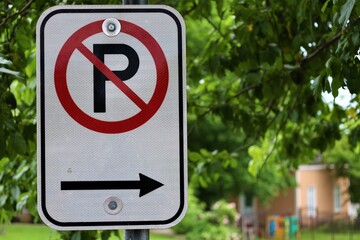Parking laws can often feel like navigating a maze, especially on private property. In Michigan, understanding the specifics of parking regulations on private property is crucial for both property owners and visitors. This article will dive into Michigan parking laws on private property, detailing what you need to know to avoid common pitfalls and ensure a smooth parking experience.
The Basics of Private Property Parking
Private property in Michigan is governed by a set of specific rules that dictate how parking can be enforced. Unlike public streets where city or municipal regulations apply, private property owners can set their own parking policies, provided they comply with state laws.
Signage
Clear and visible signage plays a crucial role in communicating parking rules and regulations on private property. Property owners must ensure that signage is prominently displayed throughout the parking area, indicating any restrictions, permit requirements, or consequences of non-compliance.
- Clear Communication: Signs should clearly convey parking rules, including restrictions on parking duration, designated areas, and any applicable permit requirements.
- Visibility: Signage must be easily visible to drivers entering the parking area, positioned at appropriate heights and angles to ensure maximum visibility.
- Compliance Information: Signage should also provide information about the towing policy and consequences of parking violations, such as the potential for vehicle towed at the owner’s expense.
Towing Policies
Michigan parking laws permit property owners to tow vehicles that violate parking regulations, but certain conditions must be met to ensure legal compliance. Proper signage is a prerequisite for initiating towing procedures on private property.
- Legal Requirements: Property owners can authorize towing of vehicles that contravene parking regulations, such as parking in restricted areas or without permission, as per Michigan law.
- Signage Requirement: Towing actions must be preceded by clear signage indicating the property owner’s towing policy. Signs should specify the circumstances under which vehicles may be towed and provide contact information for towing services.
- Compliance with Regulations: Property owners must ensure that towing actions adhere to all applicable laws and regulations, including those governing towing procedures and vehicle storage.
Permission
Prior permission from the property owner is paramount for parking on private property, regardless of whether signage is present. Individuals should seek explicit authorization before parking on private premises to avoid potential conflicts or repercussions.
- Obtaining Permission: Drivers should obtain explicit permission from the property owner or authorized representative before parking on private property, even if no signage indicating parking rules is present.
- Verbal or Written Authorization: Permission may be granted verbally or through written agreements, such as lease agreements or parking permits issued by the property owner.
- Respect for Property Rights: Respecting the property owner’s rights and regulations demonstrates responsible parking behavior and helps maintain positive relationships between property owners and users.
Regulations for Residential and Commercial Properties
Parking on private property in Michigan varies significantly between residential and commercial spaces.
Residential Properties
For residential properties, homeowners have the authority to designate parking areas and regulate access to non-residents. However, certain guidelines and considerations must be observed to ensure compliance with local regulations and promote harmonious parking arrangements within the community.
- Designated Parking Areas: Homeowners have the discretion to designate specific areas for parking within their property boundaries. This may include driveways, garages, or assigned parking spaces.
- Access Restrictions: Homeowners can enforce restrictions on parking to prevent non-residents from occupying designated parking spaces. This may involve implementing permit systems or signage to communicate parking rules.
- Tenant Parking: In multi-unit residential complexes, parking arrangements for tenants should be clearly outlined in lease agreements to avoid disputes and ensure fair allocation of parking spaces.
Commercial Properties
Parking regulations for commercial properties are governed by local zoning laws and must adhere to specific requirements to accommodate the needs of customers, employees, and visitors. Compliance with accessibility standards, particularly those outlined in the Americans with Disabilities Act (ADA), is crucial to ensure equal access for individuals with disabilities.
- Adequate Parking Provision: Business owners are obligated to provide sufficient parking spaces based on the size and nature of their commercial operations. Local zoning ordinances typically stipulate minimum parking requirements to prevent congestion and ensure convenient access.
- ADA Compliance: Parking facilities for commercial properties must comply with ADA regulations regarding accessibility for individuals with disabilities. This includes providing designated accessible parking spaces with appropriate signage, dimensions, and accessibility features such as ramps and curb cuts.
- Parking Management Strategies: Effective parking management strategies, such as designated employee parking areas and customer parking validation programs, may be implemented to optimize parking space utilization and minimize conflicts.
Legal Framework and Enforcement

Enforcement of parking on private property in Michigan can involve several legal considerations.
Legal Actions Against Unauthorized Parking
When dealing with unauthorized parking incidents, property owners in Michigan have specific legal avenues to pursue:
- Engagement of Towing Companies: Property owners hold the authority to engage towing companies to remove unauthorized vehicles parked on their premises. This action is typically taken at the expense of the vehicle owner and serves as a deterrent against future violations.
- Requirement of Legal Notices: Before towing vehicles from residential properties, property owners may be obligated to issue legal notices to the owners of unauthorized vehicles. These notices serve as formal warnings, providing vehicle owners with an opportunity to rectify the violation before towing occurs. Adhering to this legal requirement helps mitigate potential disputes and ensures procedural fairness.
Disputes and Resolutions
In instances where disputes arise regarding towing or fines for parking violations, effective resolution strategies are essential:
- Small Claims Court Proceedings: Disputes over towing or fines can be adjudicated through small claims court proceedings. This legal avenue provides a platform for individuals to seek resolution in a formal setting, with matters addressed efficiently and impartially by the court.
- Direct Negotiation: Alternatively, parties involved in parking disputes may opt for direct negotiation as a means of resolving conflicts. Direct negotiation fosters open communication and allows parties to work towards mutually acceptable resolutions, potentially avoiding the need for protracted legal proceedings.
Documentation in Legal Cases
Comprehensive documentation plays a critical role in supporting legal cases related to parking enforcement on private property:
- Photographic Evidence: Documentation such as photographs of improperly parked vehicles or signage displaying parking regulations can serve as crucial evidence in legal cases. Photographic evidence provides tangible proof of parking violations and strengthens the legitimacy of enforcement actions taken by property owners.
- Written Records: Maintaining detailed written records, including correspondence with towing companies, legal notices issued to vehicle owners, and records of communication during dispute resolution attempts, is essential. These records help establish a clear chronological narrative of events, enabling informed decision-making and ensuring procedural integrity in legal proceedings.
Safety Considerations and Liability
Safety is a key concern on private property. Michigan parking laws on private property mandate that:
Parking Area Maintenance
Maintaining parking areas free of hazards is a fundamental requirement under Michigan parking laws. Property owners are legally obligated to conduct regular inspections and promptly address any potential dangers that may compromise safety.
- Regular Inspections: Property owners must conduct routine inspections of parking areas to identify hazards such as debris, potholes, and other obstructions.
- Prompt Maintenance: Upon identifying hazards, property owners are required to take immediate action to mitigate risks. This may involve tasks such as debris removal, pothole filling, and repairing damaged surfaces.
- Snow and Ice Management: In Michigan’s cold climate, property owners must implement effective snow and ice removal strategies during winter months to prevent slips and falls.
Lighting Requirements
Proper lighting is essential for enhancing visibility and deterring criminal activities in parking areas. Michigan parking laws specify requirements for adequate lighting to ensure the safety of pedestrians and vehicles, particularly during nighttime hours.
- Adequate Illumination: Property owners must install and maintain sufficient lighting fixtures to ensure proper visibility throughout the parking facility.
- Compliance with Standards: It is essential to adhere to established lighting standards, such as those recommended by the Illuminating Engineering Society of North America (IESNA), to determine appropriate lighting levels for different areas within the parking facility.
- Regular Maintenance: Property owners should conduct regular maintenance checks of lighting fixtures to ensure optimal performance. This includes replacing burnt-out bulbs, repairing malfunctioning fixtures, and addressing any issues affecting illumination levels.
Liability Considerations
Liability concerns loom large for property owners regarding parking area safety. Michigan law imposes a duty of care on property owners to maintain safe premises and prevent foreseeable harm to individuals and property. Failure to comply with safety regulations can expose property owners to legal liabilities and financial consequences.
- Duty of Care: Property owners owe a duty of care to individuals using their parking facilities, requiring them to take reasonable measures to prevent accidents and injuries.
- Negligence Claims: Failure to uphold safety standards may result in negligence claims if accidents occur due to hazards or inadequate lighting. Property owners may be held liable for damages resulting from such incidents.
- Insurance Coverage: To mitigate liability risks, property owners should ensure they have adequate insurance coverage, such as general liability insurance, to protect against potential claims arising from accidents or injuries on their premises.
Conclusion
Navigating Michigan parking laws on private property requires an understanding of both state regulations and specific property policies. Whether you’re a property owner or a visitor, being informed about these laws helps prevent misunderstandings and disputes. Always look for posted signs and follow the property’s parking rules to ensure a hassle-free experience.
Remember, parking legally and responsibly is not just about following the law; it’s about respecting the rights and property of others. So next time you park, make sure you’re in the right spot!
FAQ
Yes, if the proper signage is posted and local ordinances are followed, immediate towing can occur.
Check for signage that provides contact information for the towing company, and reach out to them to retrieve your vehicle. Ensure you understand the fees involved.
No specific limits exist under Michigan parking laws on private property, but charges should be reasonable and clearly communicated through signage.
It’s risky to park on private property without explicit permission, even in the absence of signage. Always seek permission to avoid potential towing.



